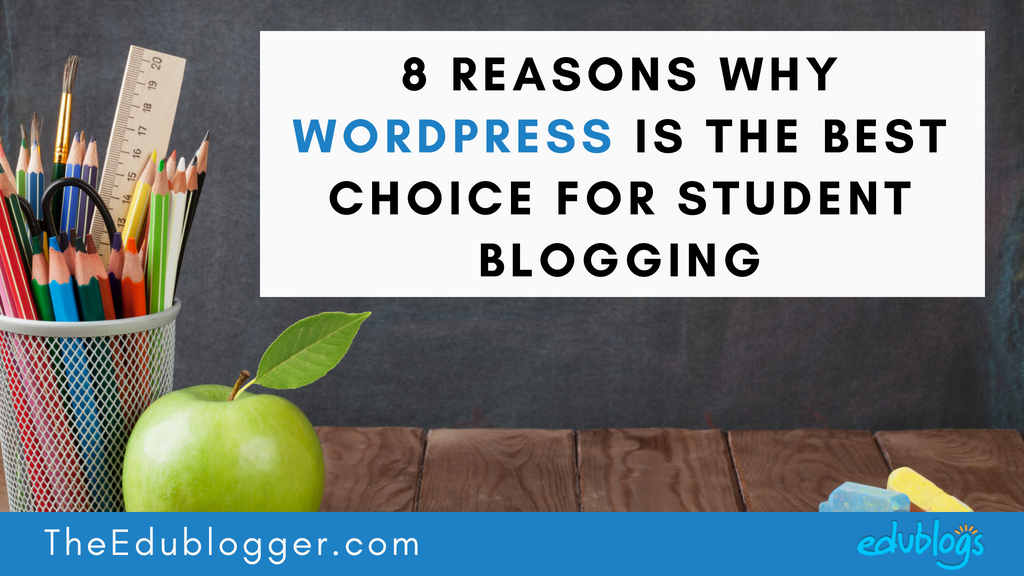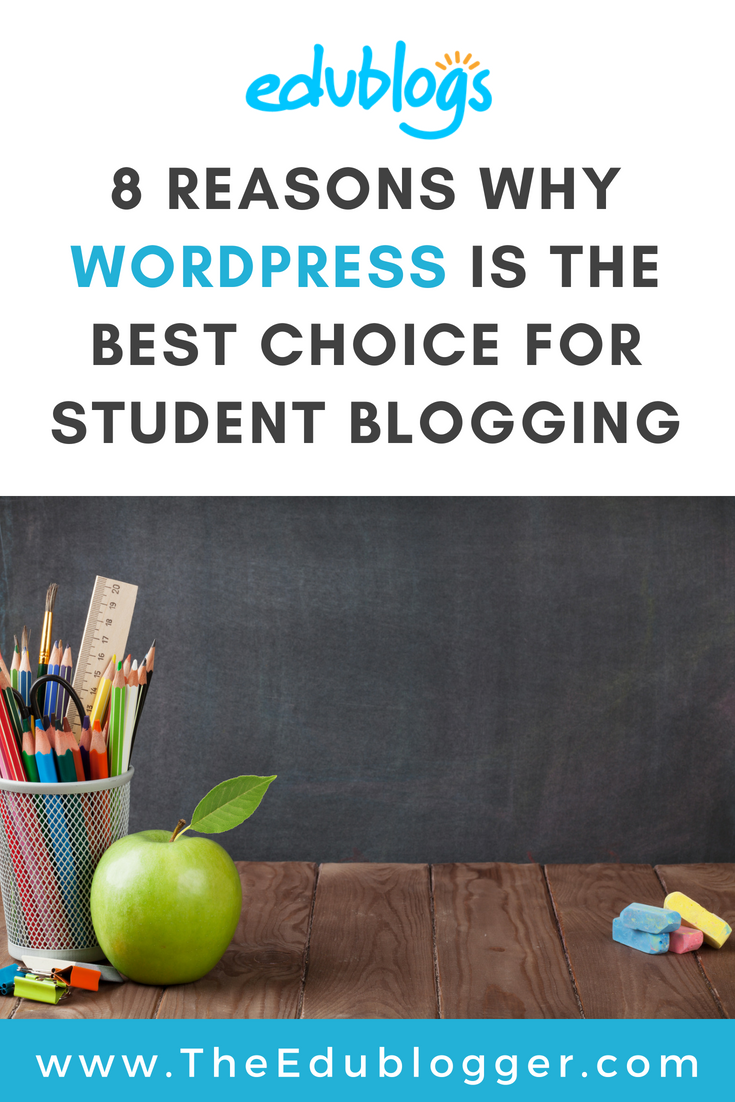There are many tools and platforms available that allow students to publish online. Naturally, these options come with pros and cons.
Edublogs and CampusPress are powered by a customized version of WordPress. WordPress is the tool of choice for the large majority of professional bloggers and online publishers.
WordPress can also be an excellent choice for our students. This post explains why!
A Brief Overview Of WordPress
 WordPress is a content management system that is behind millions of popular websites worldwide.
WordPress is a content management system that is behind millions of popular websites worldwide.
The first version of WordPress was made available for download on May 27, 2003. It has just celebrated its 15th birthday!
WordPress is simply software that’s free to download (although needs to be hosted somewhere which usually incurs costs).
WordPress is open source which means it is maintained and advanced by a global community of volunteers. This is part of the widespread appeal of WordPress.
Users can extend the functionality of their WordPress site with plugins, and can customize the look and feel of their site with different themes.
WordPress can be used on all sorts of devices, including mobiles.
8 Reasons Why WordPress Is The Best Choice For Students
1) It’s Straightforward But Not The ‘Easiest’ Option
The great thing about WordPress is despite having some more advanced features available, you don’t need to know how to do everything to achieve success. You can simply use the main publishing features and ignore the rest.
Anyone who has average computer skills can maintain a functional and attractive site with no coding knowledge. But there are options for everyone.
As the team at WordPress themselves say,
People with a limited tech experience can use it “out of the box”, and more tech-savvy folks can customize it in remarkable ways.
Some teachers may gravitate towards an ‘easier’ platform with almost no learning curve. These can be useful starting places, however, let’s not forget that easy doesn’t necessarily mean better.
Once you get started, you might be sacrificing features, customization, flexibility, authenticity, and growth, for simplicity.
As Seymour Papert famously reminded us, perhaps we should consider if ‘easy’ is what we’re really striving for.
 2) The Power Of Authenticity
2) The Power Of Authenticity
The fact that around a third of the whole web is now powered by WordPress is a statistic we can’t ignore. WordPress is an authentic tool. Professional bloggers rarely look for a drag-and-drop/ready-made publishing platform.
K-2 teachers may decide to start with a simple platform that’s designed solely for schools. This certainly isn’t a bad decision. The issue in starting this way is when educators never make the switch to a more authentic platform that will serve the students better as they progress through their schooling and lives.
Why not start as you intend to continue?
3) Students Can Do More Than You Might Think!
I’ve spent many years teaching 7 to 10 year olds. Some of my student bloggers learned amazing skills — modifying HTML codes, sourcing and attributing Creative Commons images, creating and embedding media, hyperlinked writing, authentically connecting with others around the globe … the list goes on!
A lot of the time, this was through organic peer tuition. For example, one student would figure something out. Another student would notice and enlist their classmate’s help. What a joy to see this sort of learning play out in your classroom!
The above scenario involves things like teamwork, problem solving, creativity, critical thinking, communication, research — aren’t these the sorts of skills we want our students to develop?
Are our students missing out if we try to give them all the answers and lay out every instruction for them? Do we really need to limit functions so they don’t have to figure out what buttons to press?
When you make something moderately challenging, meaningful, and open-ended for students you might be surprised at the outcomes.
4) Digital Citizenship
We know how important digital citizenship is, and one of the benefits of blogging is that it can be the ideal avenue to authentically cover this important topic. You can read more in our How To Teach Digital Citizenship Through Blogging post.
UK principal, Ross Cooper, has talked about digital citizenship being a non-negotiable and promotes the use of an authentic publishing platform.
I would go as far to say we’d be a bit hypocritical by first declaring, “Digital citizenship is important; let’s practice it!” and then saying, “Use this, because we don’t want you to experience what’s out there.” …
Nevertheless, experiences with authentic tools allow for students to apply what they’ve learned in settings that very much mimic the real world. And, at the same time, teachers are present to turn mistakes into beneficial lessons.
5) Owning Your Online Space
There’s something powerful about establishing an online space that is yours. Perhaps even with your own domain name. Students can begin shaping their own positive digital footprints from a young age.
The domain name part can come later on in a child’s schooling, or even upon graduation. And, with a WordPress blog, exporting is easy.
Audrey Watters has written about the benefits of students having their own domain,
The importance of giving students responsibility for their own domain cannot be overstated. This can be a way to track growth and demonstrate new learning over the course of a student’s school career — something that they themselves can reflect upon, not simply grades and assignments that are locked away in a proprietary system controlled by the school.
6) Export Friendly
As Ronnie Burt has talked about, choosing an export friendly platform should be a high priority when considering a web service.
We feel strongly that student work should always be completed on a platform that allows the student to archive their work or take it with them.
Sadly, there are many online services that end up closing. This can ignite a panic if teachers and students have built up a lot of content that they won’t be able to transfer.
Services do come and go, and being prepared in case it happens is key. Even more important is teaching students that what they write is theirs to keep, to do with as they wish, and to provide them with the means to do so.
It only takes minutes to export your WordPress blog as a XML (WXR) file. You can then import this content to another site as our help guide explains.
7) Versatile
WordPress used to be solely for blogs, however, that has changed.
Using different themes, plugins, and settings, a WordPress site can now be a static website, a website with a blog component, a simple blog, a portfolio, magazine, eCommerce store, course, forum, and so on. The choice is yours!
This customization allows you to precisely meet the needs of your students, school, and community. After all, your learning goals and intentions come first. The technology comes second.
8) Online Hub
The great thing about using a WordPress based platform is you’re not saying no to all the wonderful web tools that are out there. In fact, you’re able to embrace them!
A blog is simply a blank canvas that can be your online home. Along with text, you can add images of digital or analogue work, and embed a wide range of media including video, podcasts, comics, polls, Google Docs, Sheets, Slides and more! Not to mention the extra functionality available with plugins and widgets.
There are more ways than ever before to learn, create, and connect. As Silvia Tolisano says, “a blogfolio can be the glue that holds all the puzzle pieces together.”
What Makes Edublogs The Ideal Solution?
We’ve looked at some key reasons why WordPress is a good choice, but of course, Edublogs and CampusPress are not the only WordPress hosting solutions available. So why do so many teachers and educational institutions choose us?
Our latest survey on the State Of Educational Blogging indicated that the key reasons why educators choose Edublogs include:
- Personal 24/7 support
- Made for education
- Free/affordable
- No advertising
- School/department approved
- Privacy settings
- Easy student blog management with My Class
- Ease of use
- Built from WordPress
- Safe and robust
- Recommended
If you want to start a blog to use with your students my first recommendation is to try Edublogs. It runs on the powerful WordPress platform but doesn’t require you to worry about any of the technical aspects of using WordPress. More importantly, you have control over the creation of your students’ usernames and passwords. Blogs and individual blog posts can be made private, password-protected, or public.
~ Richard Byrne, Free Technology For Teachers
Any further thoughts or questions? Leave a comment and we’ll get back to you!
You Might Also Enjoy Reading
The Top 10 Ways Blogs And WordPress Are Used In School
40+ Popular Widgets For Your Blog
Different Approaches To Using Student Blogs And Digital Portfolios



thanks for your informative post.
I would like to use your valuable information to my academy’s students.
Hi Alex
Please email [email protected] with what you need.
I’m a student too and i’ve been using WordPress for a very long time . Is is one of the best way to express and share you writing with the world . I found it pretty easy to use and the versatility of this site is amazing.
Thank you for the nice article and useful information.
I started to “play” with edublgs, but merely use it like other CMS. However, the possibilities for interaction with the world and personal network are awesome.
For getting guests of my blog really active I would love to have the H5P-plugin and maybe a LMS. Will this be possible in the near future?
Hi Dr. Bernd,
Thanks for your comment. Our team has done some testing to see if we can add the H5P plugin but unfortunately, it is problematic so won’t be able to be added. You can still use the H5P website to create content and embed it in your blog.
What sort of LMS features would you be interested in using? Would you want to use your Edublogs site only as an LMS or just use certain features?
Thanks!
nice blog, keep it up!
I’ve been a fan of WordPress since it’s very early days as merely a blogging platform. I am currently using my Edublog account to create an ePortfolio for my degree as well as creating opportunity for people to subscribe to follow and interact with me along the way!
That’s awesome, Foster! I like the way you’ve set it up as an ePortfolio with a blog component. Thanks for sharing!
nice article and comparison.
Oh! interesting! I really enjoyed reading this article. 😀
Edublog is definitely more straightforward than other blog websites I have tried.
Glad to hear Edublogs has been a good choice for you! 🙂
Nice article! I believe that this list accurately illustrates some of the key components to the success and popularity of WordPress as well as Edublogs.
Thanks for sharing your feedback!
interesting